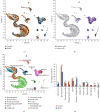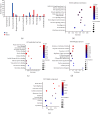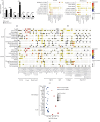Single-Cell RNA Sequencing Analysis of Steroidogenesis and Spermatogenesis Impairment in the Testis of db/db Mice
- PMID: 38817616
- PMCID: PMC11139535
- DOI: 10.1155/2024/8797972
Single-Cell RNA Sequencing Analysis of Steroidogenesis and Spermatogenesis Impairment in the Testis of db/db Mice
Abstract
Objective: The mechanism of steroidogenesis and spermatogenesis impairment in men with type 2 diabetes remains unclear. We aimed to explore the local changes of steroidogenesis and spermatogenesis in the testis of db/db mice. Research Design and Methods. We performed single-cell RNA sequencing analysis in the testis of db/db and C57BL/6J mice. The differentially expressed genes were then confirmed by real-time PCR. The histopathological characteristics of testis in db/db mice and C57BL/6J control were also performed.
Results: The 20-week-old db/db mice had significantly higher blood glucose and body weight (both p < 0.001). The serum testosterone levels (4.4 ± 0.8 vs. 9.8 ± 0.7 ng/ml, p=0.001) and weight of the testis (0.16 ± 0.01 vs. 0.24 ± 0.01 g, p < 0.001) were significantly lower in db/db mice than that in C57BL/6J controls. db/db mice had a lower cross-sectional area of seminiferous tubules and thickness of the cell layer (both p < 0.05). The numbers of Sertoli cells and Leydig cells decreased in db/db mice (both p < 0.01). Single-cell RNA sequencing analysis showed that compared with the control group, the percentage of spermatogonia was significantly higher in the db/db mouse (p < 0.001), while the proportions of spermatocytes, round and elongating spermatids, and sperms were all lower in the db/db mouse (p all < 0.001). The most differentially expressed genes were found in round spermatids (n = 86), which were not found in spermatogonia, spermatocyte, and sperm. Igfbp5 was the most significantly decreased gene in Leydig cells of the db/db mouse, while the expression of Cd74, H2-Aa, and H2-Eb1 was elevated. Ccl7 and Ptgds were the most significantly increased and decreased genes in Sertoli cells of the db/db mouse.
Conclusions: The present study indicates spermiogenesis and steroidogenesis defects in db/db mice. The mechanism of steroidogenesis impairment in the testis of db/db mice deserves further investigation.
Copyright © 2024 Yun Hu et al.
Conflict of interest statement
The authors declare that there are no conflicts of interest.
Figures




References
-
- Barkabi-Zanjani S., Ghorbanzadeh V., Aslani M., Ghalibafsabbaghi A., Chodari L. Diabetes mellitus and the impairment of male reproductive function: possible signaling pathways. Diabetes and Metabolic Syndrome: Clinical Research Reviews . 2020;14(5):1307–1314. doi: 10.1016/j.dsx.2020.07.031. - DOI - PubMed
LinkOut - more resources
Full Text Sources
Miscellaneous

